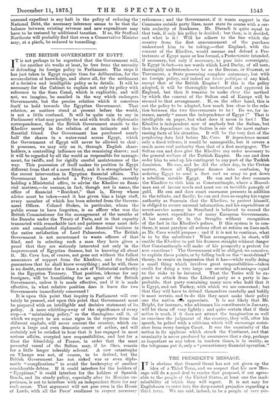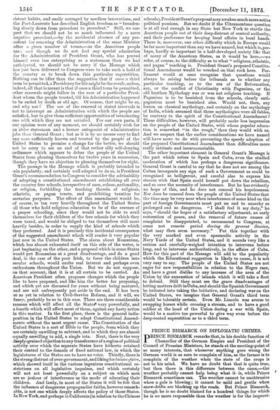THE PRESIDENT'S MESSAGE.
IT is obvious that General Grant has not yet given up the idea of a Third Term, and we suspect that his new Mes- sage will do a good deal to render that proposal, if not agree- able to the people of the United States, at least one the inad- missibility of which they will regret. It is not easy for Englishmen to enter into the deep-rooted prejudice regarding a third term. We are said, indeed, to be a people of very per- istent habits, and easily outraged by needless innovations, and the Poet-Laureate has described English freedom as " broaden- ing slowly down from precedent to precedent." Still, we sus- pect that we should not be so much influenced by a mere negative precedent,—by the accidental absence of any pre-. -tedent for renewing the Administration of the same Minister -after a given number of terms,—as the American people sore; and though we do not feel any special admiration for the Administration of President Grant, who has proved himself even less enterprising as a statesman than we had anticipated, we should not be sorry if the Message which has just been delivered to Congress were to take such a hold of the country as to break down this particular superstition. Nothing can be idler than the suggestion that if once a third term be permitted, a Presidency for life might be the result, unless, indeed, all that is meant is that if once a third term be permitted, other renewals might follow in the case of a particular Presi- dent whom the people trusted, till his Administration happened to be ended by death or old age. Of course, that might be so, and why not ? The use of the renewal at stated intervals is not to interrupt an Administration with which the people are satisfied, but to give them sufficient opportunities of terminating one with which they are not satisfied. For our own parts, if our opinion were of any moment, we should certainly wish for an abler statesman and a keener antagonist of administrative jobs than General Grant ; but as it is by no means easy to find any man sufficiently known and trusted by the people of the United States to promise a change for the better, we should not be sorry to see an end of that rather silly self-denying ordinance which appears to debar the people of the United States from pleasing themselves for twelve years in succession, though they have no objection to pleasing themselves for eight.
The passage in the Message which is probably intended to win popularity, and certainly well adapted to do so, is President Grant's recommendation to Congress to consider the advisability of adopting a constitutional amendment establishing all over the country free schools, irrespective of race, colour, nationality, or religion, forbidding the teaching therein. Of religious, atheistic, or pagan tenets, and prohibiting taxation for sectarian purposes. The effect of this amendment would be, of course, to tax very heavily throughout the United States all those who hold religious education to be of the essence of a proper schooling, since they would not be able to avail themselves for their children of the free schools for which they were taxed, and would be obliged to tax themselves still more heavily besides, in order to supply the kind of schools which they preferred. And it is precisely this incidental consequence of the suggested amendment which will render it very popular just now in the United States. The alarm about Romanism, which has almost exhausted itself on this side of the water, is just beginning on the other, and a proposal which in some States would put Romanism at a great disadvantage, and do a good -deal, in the case of the poor Irish, to force the children into secular schools, would excite real interest and perhaps even enthusiasm throughout the Union. But we do not suppose, on that • account, that it is at all certain to be carried. An American President often proposes changes which the people like to have proposed, and like him the better for proposing, and which yet are discussed for years without being matured, and are not unfrequently put aside in the end. It has been so as yet in relation to Civil-Service Reform, and it will, we fancy, probably be so in this case. There are three considerable reasons which will affect all the State# very powerfully, and a fourth 'which will affect most of them, against any hasty action in this matter. In the first place, there is the general indis- position in the United States to adopt Constitutional Amend- ments without the most urgent cause. The Constitution of the tnited States is a sort of Bible to the people, from which they are certainly unwilling to subtract, and to which they are almost equally-unwilling to add, a single iota. Next, there is the very deeply-grained objection to any transference of a region of political activity over which the separate States have hitherto retained their control to the domain of fixed national law, in which the legislatures of the States are to have no voice. Thirdly, there is the strong distrust of over-government, and liking for laissez-faire, which showed itself in the various ingenious constitutional re- strictions on all legislative impulses, and which certainly will not act least powerfully on a subject on which men are so jealous of interference as the mode of educating their children. And lastly, in most of the States it will be felt that the influence of dangerous propogandist faiths, however remark- able is not one which- deeply affects the policy of those States. In New York, and perhaps in California (in relation to the Chinese ' schools), President Grant's proposal may awaken much more active political passions. But-we doubt if the Ultramontane question is at all real enough in any State but New York to startle the American people out of their deep distrust of central authority, and their preference' for keeping local affairs in local hands. There is, moreover, one other difficulty which in Europe would be far more important than any we have named, but which is, per- haps, hardly so important in a half-developed society like that of many of the American States, as it would-be here,—we refer, of course, to the difficulty as to what " religious, atheistic, and pagan " teaching is. President Grant's proposed Constitu- tional Amendment would be wrecked on that rock here. Par- liament would at once recognise that questions would always be arising before the tribunals as to whether any particular teaching, as to the era of the Reformation, say, or the conflict of Christianity with Paganism, or the old heathen Mythology was or was not religious teaching. If Paganism is to be banished from the schools, clearly anti- paganism must be banished also. Would not, then, any lesson on classical mythology, and certainly on the mythology of India, which assumed that those mythologies were all fables, be contrary to the spirit of the Constitutional Amendment ? These difficulties, however, will probably make less impression on the people of the United States, with whom popular educa- tion is somewhat "in the rough," than they would with us. And we suspect that the earlier considerations we have named will have more to do with preventing the speedy adoption of the proposed Constitutional Amendment than difficulties more really intrinsic and insurmountable.
The other important element in General Grant's Message is the part which refers to Spain and Cuba, even the studied moderation of which has perhaps a dangerous significance. General Grant is careful to say that he does not see among the Cuban insurgents any sign of such a Government as could be recognised as belligerent, and careful also to express his sincere wish that Spain- could herself put down the rebellion, and so save the necessity of interference. But he has evidently no hope of this, and he does not conceal his hopelessness. Nor does he conceal from the people of the United States that the time may be very near when interference of some kind on the part of foreign Governments must put an end to anarchy so prolonged and so dangerous. "I shall feel it my duty," he says, " should the hopes of a satisfactory adjustment, an early restoration of peace, and the removal of future causes of complaint be disappointed, to recommend to Congress, at some not remote period during the present Session, what may then seem necessary." Put this together with the very marked and even spasmodic activity in the Navy Yards of the United States, and it sounds very like a serious and carefully-weighed intention to intervene before long, and to intervene authoritatively, in the affairs of Cuba. How far this part of the Message will add to the popularity which the Educational-suggestion is likely to cause, it is not very easy to say. The people of the United States are not eager for new responsibilities in relation to the Negro race, and have a great dislike to any increase of the area of the Union by the annexation of -islands which it will take a fleet to defend. Still they must see the grave disadvantages of letting matters drift in Cuba, and should the Spanish Government be irritated into taking the initiative, and declaring war on the United States, we imagine that General Grant's third term would be tolerably certain. Even Mr. Lincoln was averse to swapping horses while crossing a stream, and to have a good soldier at the head of the Union during a war with Spain, would be a motive too powerful to give way even before the deep-rooted superstition as to a third term.







































 Previous page
Previous page